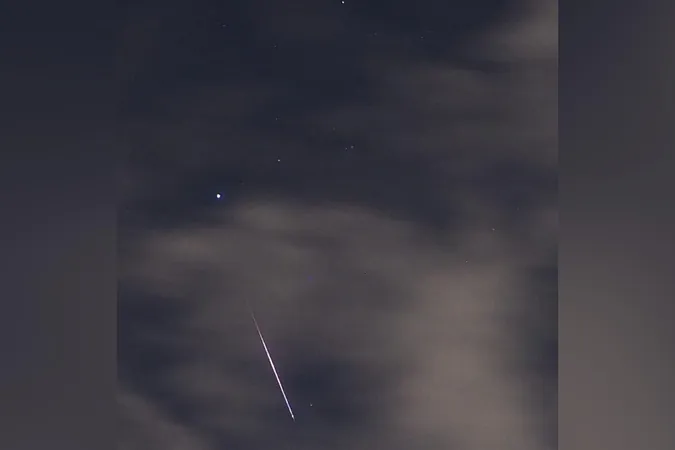
Unlocking the Secrets of the Universe: British Space Company to Launch Satellite Fleet Around the Moon
2025-04-09
Author: Wei
A Revolutionary Mission to Explore the Early Universe
In an exciting breakthrough for space exploration, a British company is set to unveil a fleet of satellites designed to orbit the moon and potentially unveil the mysteries of the early universe.
Blue Skies Space Takes Center Stage
Blue Skies Space has been tasked by the Italian Space Agency with creating a groundbreaking satellite system aimed at detecting faint radio signals emanating from the universe's infancy. These elusive signals, crucial for understanding the cosmos, are significantly obscured by human-made noise on Earth. However, the untouched far side of the moon provides a perfect listening post, free from terrestrial interference.
Peeking into the Dark Ages of the Universe
Dr. Marcell Tessenyi, CEO of Blue Skies Space, expressed the ambition behind the project: "Our goal is to peer into the universe's dark ages and gather insights about its large-scale structures. This would be nearly impossible from the surface of the Earth." With a budget of €200,000, the initiative will explore whether four or more satellites can successfully pick up radio signals from the FM range, offering glimpses of a time just a million years after the Big Bang.
The Moon: An Ideal Observatory
The choice of the lunar far side as a location for these satellites is strategic; it’s an area shielded from Earth’s disruptive signals, making it an ideal site for astronomical investigation.
Nasa's Groundbreaking Advances
NASA has already laid the groundwork for lunar radio observations with its ROLSES-1 telescope, which has demonstrated the feasibility of this technology despite some operational setbacks. Moreover, NASA is preparing to launch the LuSEE-Lite, a small radio telescope that will be situated on the moon's far side, with future plans for a massive radio telescope to be constructed using advanced robotics.
Integrating with Lunar Infrastructure
Blue Skies Space proposes utilizing CubeSats, equipped with commercially available components, forming part of the European Space Agency's Moonlight program. This initiative aims to establish a network of satellites in lunar orbit, enhancing communications and navigation in space.
A New Era of Astronomy Awaits
By reinforcing this lunar infrastructure, Blue Skies hopes to ensure precise positioning for astronomical satellites while enabling the transmission of invaluable data back to Earth. This mission not only marks a significant leap in our quest to understand the cosmos but could also redefine our approach to space exploration.




 Brasil (PT)
Brasil (PT)
 Canada (EN)
Canada (EN)
 Chile (ES)
Chile (ES)
 Česko (CS)
Česko (CS)
 대한민국 (KO)
대한민국 (KO)
 España (ES)
España (ES)
 France (FR)
France (FR)
 Hong Kong (EN)
Hong Kong (EN)
 Italia (IT)
Italia (IT)
 日本 (JA)
日本 (JA)
 Magyarország (HU)
Magyarország (HU)
 Norge (NO)
Norge (NO)
 Polska (PL)
Polska (PL)
 Schweiz (DE)
Schweiz (DE)
 Singapore (EN)
Singapore (EN)
 Sverige (SV)
Sverige (SV)
 Suomi (FI)
Suomi (FI)
 Türkiye (TR)
Türkiye (TR)
 الإمارات العربية المتحدة (AR)
الإمارات العربية المتحدة (AR)